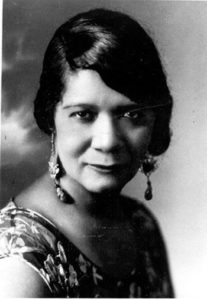
Portia W. Pittman
Portia Washington Pittman was born on this date in 1883 in Tuskegee, AL. She was a Black musician and teacher and the only daughter of Booker T. and Fannie (Smith) Washington.
Her father was the founder of the Tuskegee Institute. After her mother died in 1884, Portia was cared for by nursemaids and two stepmothers. An accomplished pianist by age ten, she attended New England's finest boarding schools, including Framingham State Normal School in Massachusetts in 1895, Tuskegee Institute, and, in 1901, Wellesley College in Massachusetts.
In 1905, Washington was the first Black to obtain a degree from the Bradford Academy (now Bradford Junior College). On Halloween 1907, in the chapel of Tuskegee Institute, she married William Sidney Pittman, a Tuskegee student and teacher she had met in 1900. They decided to move to Washington, D.C., where he established an architectural practice and built their home in Fairmont Heights, Maryland. Between 1908 and 1912, she gave birth to three children.
Pittman made her concert debut in a joint recital with Clarence Cameron White in May 1908 in Washington, and they toured together. Money problems plagued them, Sidney's architectural contracts dried up, and Pittman began giving private piano lessons for income. Her husband’s vanity was wounded by his wife's having to work and by her family's fame. In 1913, Pittman’s husband moved the family to Dallas, TX. After contracts again dropped off, financial difficulties again plagued Portia's life. On November 14, 1915, Portia’s father died, and three years later, a fire destroyed their second Dallas home.
But the improvement in the family's fortunes began at this time, as her husband became the president of the Brotherhood of Negro Building Mechanics of Texas. In 1925, Portia began teaching music at Booker T. Washington High School. She also chaired the education department of the Texas Association of Negro Musicians.
In March 1927, at the National Education Association convention in Dallas, while nearly 7,500 teachers attended, a 600-voice choir from Booker T. Washington High School. Under her direction, they sang a medley of popular and spiritual songs. It was the first time in history that a Black high school group had appeared in the National Education Association (NEA) program. NEA president Randall J. Condon, a Los Angeles, CA, principal, judged the performance a "complete success."
In 1928, Portia left Pittman, took Fannie, and began teaching piano, public school music, glee club, and choir at Tuskegee that same year. The school had changed since her father's death, and now required all faculty members to hold academic degrees to teach. Lacking such credentials, Portia was removed by 1939 but opened her private music studio in her home. In 1944, at age 61, she retired. She now dedicated herself to a campaign to preserve her father's birthplace in Virginia as a national monument.
Her efforts to memorialize her father were successful on May 23, 1946, when a bust of her father was installed in the Hall of Fame in New York. On August 7, 1946, President Harry Truman signed a bill "authorizing the minting of five million Booker T. Washington commemorative fifty-cent coins." She also oversaw the establishment of the Booker T. Washington Foundation, which provides academic scholarships for Black students. Portia suffered financial and health problems during the last years of her life, yet was inspired by the rediscovery of Black history during the 1960s and the assurance that her father would be remembered as a great African American leader. She died on February 26, 1978, in Washington, D.C.
Biographical Dictionary of Afro-American and African Musicians
Eileen Southern
(Westport, Connecticut: Greenwood, 1982).
Portia: The Life of Portia Washington Pittman, the Daughter of Booker T. Washington
Ruth Ann Stewart,
(Garden City, New York: Doubleday, 1977).